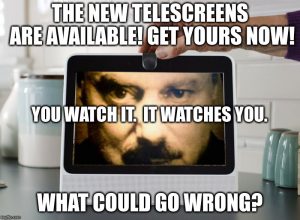In the famous dystopian science fiction novel 1984, there is something called a ‘telescreen’, which broadcasts as well as monitors all people everywhere they go. Once thought to be only in books, and as well as a warning about the future and what could happen. However, it seems that few have paid attention, as a full two-thirds majority of Americans now have no problem being monitored all the time by their devices.
Are the ads popping up in your smart device a little too spot on? Is it an eerie coincidence or are your smartphones and smart speakers listening in on everything you say in private? Privacy issues are a constant concern when it comes to digital technology, but a new survey finds many Americans are simply accepting they may not be alone in their own home. Researchers say two in three U.S. adults “don’t care” if their smart devices are always listening to what they say.
The report by Safety.com finds 66.7 percent of U.S. residents over 18 wouldn’t have a problem finding out a home gadget is listening in on what’s going on inside their home. Researchers polled nearly 1,100 people between the ages of 18 and 64 during December of 2020.
While tech companies repeatedly assure the public smart devices are not spying on their owners, not everyone is convinced of this. That feeling is particularly prevalent among older adults. The survey finds baby boomers are much more concerned about digital devices recording their conservations than Millennials or young adults in Generation Z. Adults in Generation X are split on the issue.
The poll also finds women are more unnerved about smart devices than men are, by a margin of seven percent. Unsurprisingly, residents in tech-dominant cities and regions are more accepting of potentially being recorded than Americans in communities with less high-tech development.
The Safety.com team says modern technology, capable of tracking every move we make, is becoming an unavoidable part of daily life. From smart speakers in the kitchen to smart cameras in the doorbell, this technology is built to record, watch, or listen to information in real time.
Although many might wonder how their interests end up in the next commercial their speakers play, researchers note few Americans really go through the terms and services agreement when downloading their various apps. They add skipping these privacy notices has actually become second nature to many tech users. Therefore, do many people really know how much data they’re agreeing to share with companies?
The poll finds the general sentiment regarding privacy and technology is “if someone isn’t guilty of anything, then what difference does it make if they’re being listened to?”
Digital amenities outweigh privacy concerns
As legal and privacy experts continue to debate how ethical that sentiment is, Safety.com finds more and more people are choosing convenience over their own privacy. This is especially true when it comes to owning smartphones. (source)
The future is here. You are living it. Science fiction has become science fact, and the people have accepted it as such.
There was no fighting. There was no resistance. There was “but muh feels man”. That was all, nothing else, just a slow, quiet descent into a dystopic future, trading freedom for an illusion of security.
The future has already happened. We are living it, and it is going to get a lot more interesting, especially as people absorb the idea that continual surveillance just like animals in a pen is ‘normal’, even as they are being lead to slaughter by the same people they claim are caring for them.



